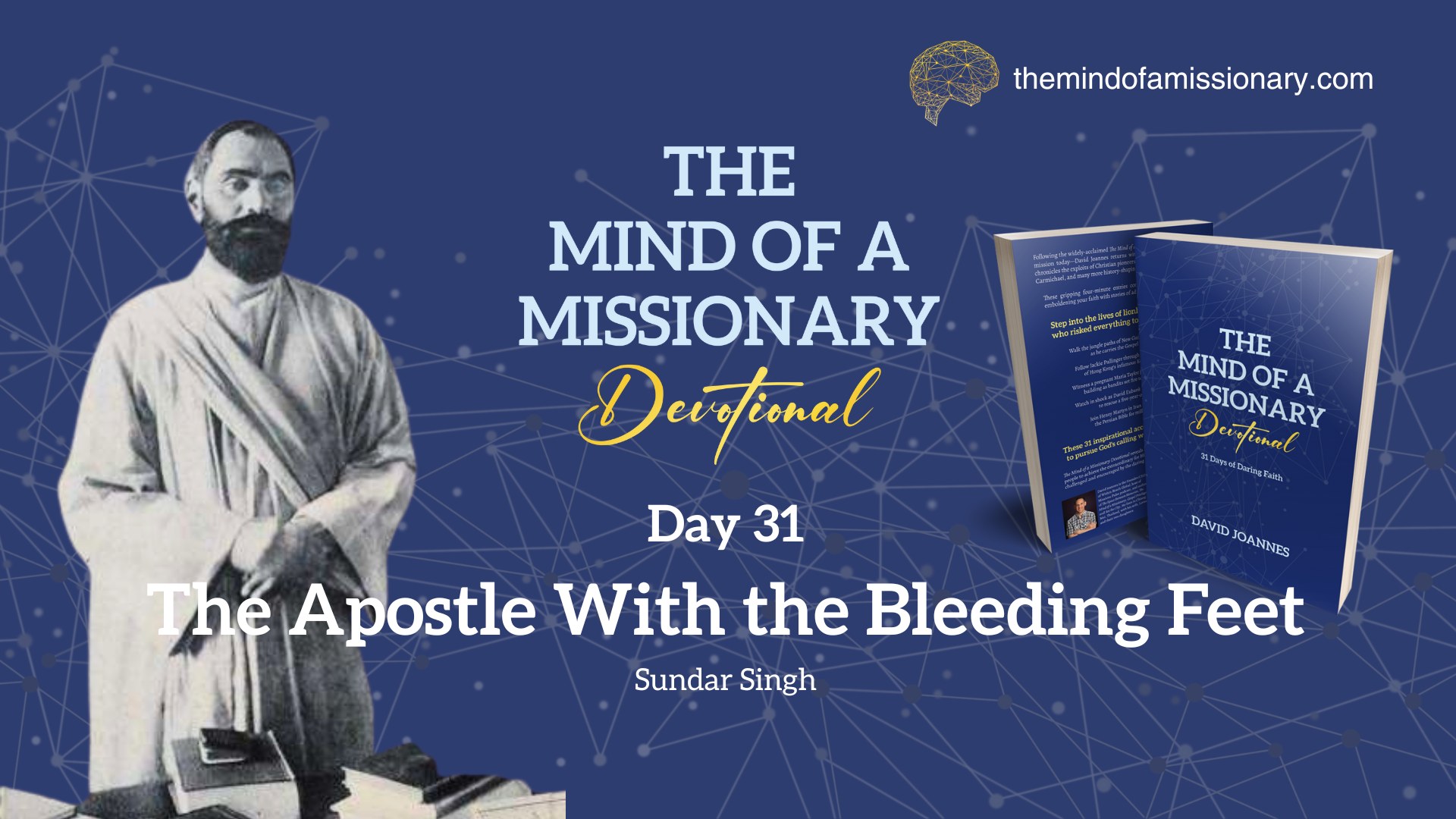Day 31
The Mind of a Missionary Devotional
The Apostle With the Bleeding Feet
Sundar Singh
“How beautiful on the mountains are the feet of those who bring good news, who proclaim peace, who bring good tidings, who proclaim salvation, who say to Zion, ‘Your God reigns!’” — Isaiah 52:7
The young Indian boy stood over the flickering flames, seething with grief and defiance. He tore page after page from a Bible, feeding the Scriptures to the fire until they curled and blackened. With each crackle and pop, he felt a twisted sense of satisfaction, as if by burning Christianity’s holy book, he was silencing God’s claims on his life. Nothing could be further from the truth, as he discovered days later.
Fourteen-year-old Sundar Singh’s extravagant actions did not reflect his tolerant upbringing. His parents, devout Sikhs from Punjab State in northern India, raised their son to respect all religions while adhering to their own religious customs. However, after Sundar’s beloved mother died in 1903, he lashed out at the Christian faith. In his grief and anger, he hurled insults and stones at Indian Christians and foreign missionaries. The Bible burning was his final act of defiance before encountering the God of Christianity.
“I thought I had done a good deed in burning the Gospel,” Sundar said, “yet my unrest of heart increased.” In a desperate plea, he whispered, “God, if You are real, reveal Yourself to me. If not, I will end my life tonight.” In his darkest hour, on the verge of a terrible and final decision, Christ’s relentless love shone through.
With the railway tracks in sight, the Ludhiana Express approaching, and suicide on his mind, Sundar encountered Jesus in a vision that changed his life forever. The same Jesus who met Paul on the Damascus road revealed Himself to a broken-hearted Indian boy, extinguishing the raging fires of grief and setting his heart ablaze with an unquenchable passion.
The following day, he shocked his father by announcing his faith in Jesus. Though he did not condone the Bible burning, his father demanded that his son abandon the Christian faith. When Sundar refused, his father held a farewell feast, poisoned the food, and publicly denounced his son. Sundar narrowly escaped the poisoning, the first of many persecutions to follow.
In October 1906, he embarked on his first missionary journey as a new Christian, traveling north through India, over the Banihal Pass into Kashmir, across Muslim Afghanistan, and into Pakistan’s bandit-infested borderlands. “I am not worthy to follow in the steps of my Lord,” he said, “but, like Him, I want no home or possessions. Like Him, I will belong to the road, sharing the suffering of my people, eating with those who will give me shelter, and telling all men of the love of God.”
He found that Western society’s materialism and colonialism significantly hindered Gospel proclamation in Asia. He argued that Indians who adopted British customs and attire inadvertently alienated themselves from the cultures they hoped to reach. Seeking to forge an Indian identity for the Indian Church, Sundar donned the saffron robe of a sadhu, an ascetic devoted to spiritual practice to blend in with the cultures to whom he preached.
Through the scorching heat of the desert and the biting cold of the mountains, he spread Christ’s message to unreached areas, his feet bearing the scars of unwavering devotion. “The apostle with the bleeding feet” looked like Jesus and spoke and acted like Him.
Sundar spent twenty-five years ministering to leprosy patients in the Himalayan foothills, nomadic people in Tibet, and marginalized outcasts in India. He was arrested and stoned for his faith, poisoned several times, had snakes thrown into his room, and trekked over perilous mountain paths to spread Jesus’ love. Despite the opposition, he remained determined to carry out his sacred purpose. “From my many years of experience,” he stated, “I can unhesitatingly say that the cross bears those who bear the cross.”
In the twilight of his life, Sundar set out on one final missionary journey; his gaze fixated on the mountains of Tibet, where countless souls waited in the shadows. In April 1929, the prematurely aged figure in his saffron robe ascended into the misty Himalayas alongside Hindu pilgrims walking the same rugged paths. Whether he died of exhaustion or reached the summit remains a mystery. Sundar’s body was never located after he disappeared in Tibet.
“Those who determine not to put self to death will never see the will of God fulfilled in their lives,” he proclaimed. “Those who ought to become the light of the world must necessarily burn and become less and less. By denying self, we are able to win others.” From Bible burner to barefoot preacher, Sundar Singh blazed for Jesus and kindled a spiritual desire in everyone he met.
– Personal Response –
Passage: How beautiful on the mountains are the feet of those who bring good news, who proclaim peace, who bring good tidings, who proclaim salvation, who say to Zion, “Your God reigns!” (Isaiah 52:7)
Point: A surrendered life, no matter how broken, can carry the Gospel to the hardest places and shine the brightest light.
Ponder: Are you willing to surrender your comfort or reputation to carry the good news to those who have yet to hear it?
Prayer: Lord, burn away my pride and fear. Make my life a vessel of Your love, and lead me wherever You desire, even to the difficult places. In Jesus’ name, amen.
Proclamation: I will follow Jesus boldly, even if the path is hard. My life is not my own—it belongs to the One who gave everything for me.
Practice: Choose one intentional way to live sacrificially for the Gospel today, whether by speaking to someone about Christ, giving generously, or praying for an unreached people group. Let your faith leave footprints.
Learn more about The Mind of a Missionary Devotional at themindofamissionary.com




